University Case Study: Analysis of Jodie's Anxiety in NRSG 263 Module
VerifiedAdded on 2023/01/20
|6
|1012
|76
Case Study
AI Summary
This case study analyzes the case of Jodie, a 10-year-old girl exhibiting symptoms of anxiety, including refusal to attend school and abdominal pain. The analysis applies the Clinical Reasoning Cycle (CRC) to assess Jodie's mental state, identify potential risks (including abuse), and consider relevant mental health legislation and ethical considerations. The assessment includes a Mental State Examination (MSE) and a strengths-based approach, emphasizing the involvement of Jodie's supportive mother in the care plan. The case study explores other necessary assessments, such as physical and environmental risk evaluations, and discusses psychotropic medications, including benzodiazepines, considering their side effects and adverse effects. The care plan involves psychological counseling and potential medication, with nursing interventions focused on risk minimization and psychoeducation for Jodie's family. The analysis refers to relevant literature, including the MHCC Mental Health Rights Manual and research on psychotropic medication for children.
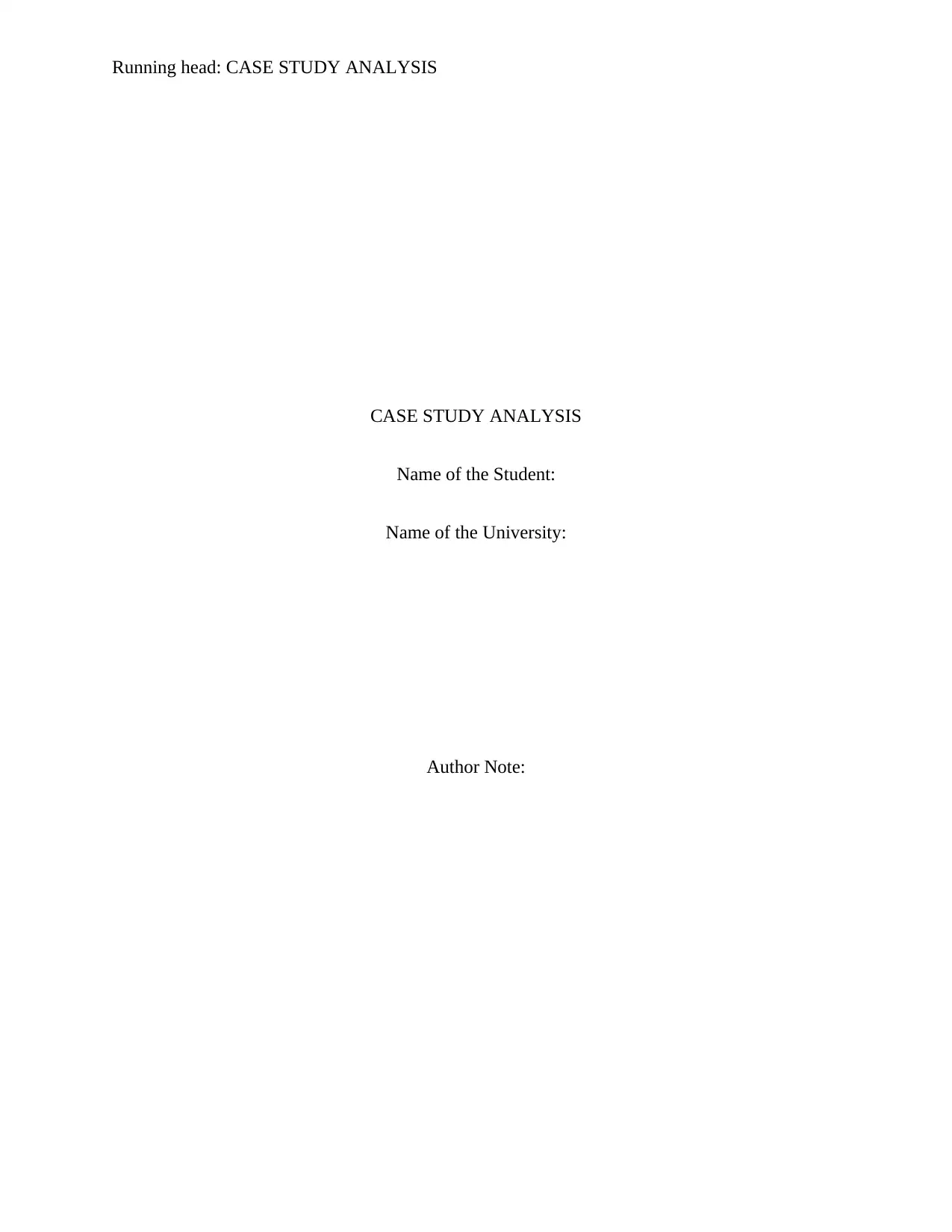
Running head: CASE STUDY ANALYSIS
CASE STUDY ANALYSIS
Name of the Student:
Name of the University:
Author Note:
CASE STUDY ANALYSIS
Name of the Student:
Name of the University:
Author Note:
Paraphrase This Document
Need a fresh take? Get an instant paraphrase of this document with our AI Paraphraser
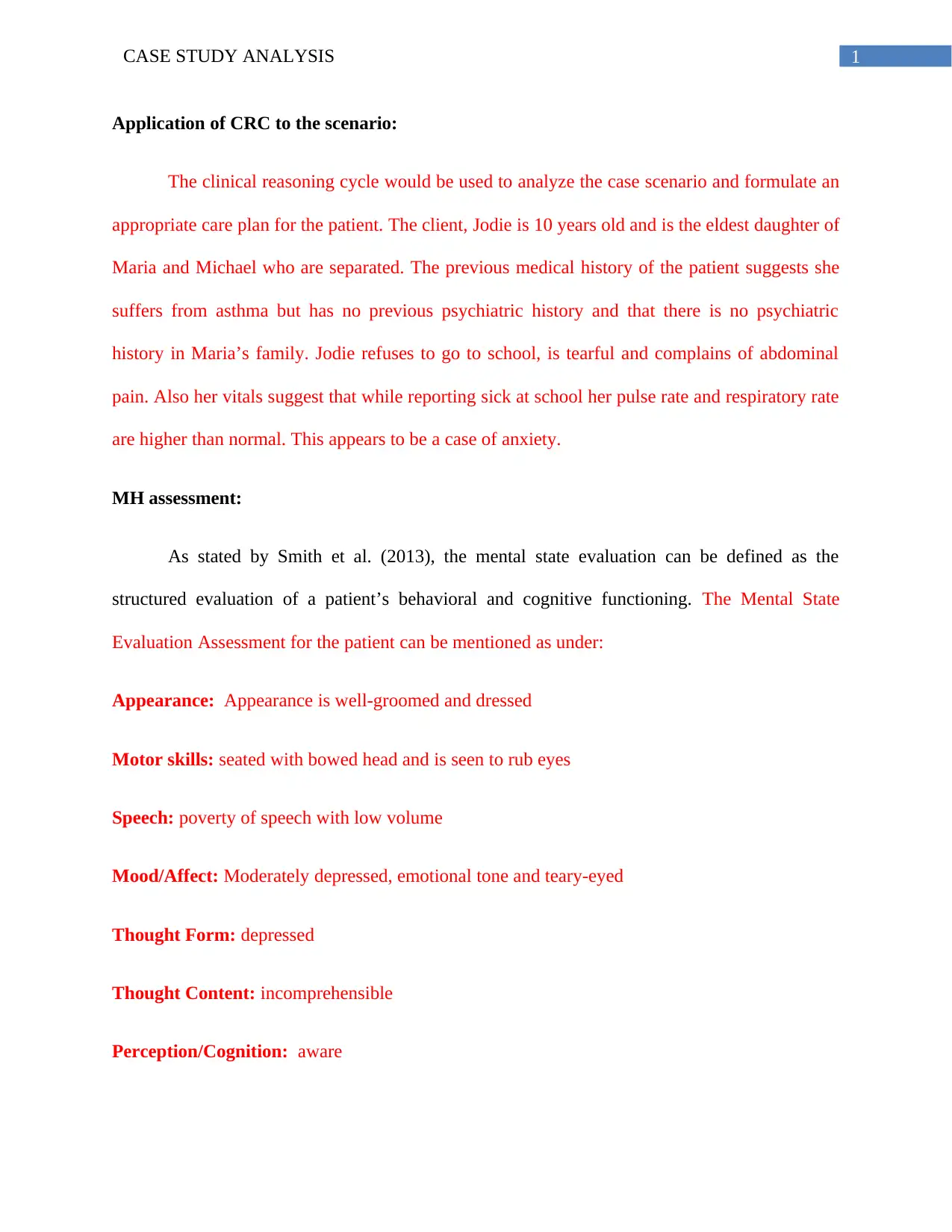
1CASE STUDY ANALYSIS
Application of CRC to the scenario:
The clinical reasoning cycle would be used to analyze the case scenario and formulate an
appropriate care plan for the patient. The client, Jodie is 10 years old and is the eldest daughter of
Maria and Michael who are separated. The previous medical history of the patient suggests she
suffers from asthma but has no previous psychiatric history and that there is no psychiatric
history in Maria’s family. Jodie refuses to go to school, is tearful and complains of abdominal
pain. Also her vitals suggest that while reporting sick at school her pulse rate and respiratory rate
are higher than normal. This appears to be a case of anxiety.
MH assessment:
As stated by Smith et al. (2013), the mental state evaluation can be defined as the
structured evaluation of a patient’s behavioral and cognitive functioning. The Mental State
Evaluation Assessment for the patient can be mentioned as under:
Appearance: Appearance is well-groomed and dressed
Motor skills: seated with bowed head and is seen to rub eyes
Speech: poverty of speech with low volume
Mood/Affect: Moderately depressed, emotional tone and teary-eyed
Thought Form: depressed
Thought Content: incomprehensible
Perception/Cognition: aware
Application of CRC to the scenario:
The clinical reasoning cycle would be used to analyze the case scenario and formulate an
appropriate care plan for the patient. The client, Jodie is 10 years old and is the eldest daughter of
Maria and Michael who are separated. The previous medical history of the patient suggests she
suffers from asthma but has no previous psychiatric history and that there is no psychiatric
history in Maria’s family. Jodie refuses to go to school, is tearful and complains of abdominal
pain. Also her vitals suggest that while reporting sick at school her pulse rate and respiratory rate
are higher than normal. This appears to be a case of anxiety.
MH assessment:
As stated by Smith et al. (2013), the mental state evaluation can be defined as the
structured evaluation of a patient’s behavioral and cognitive functioning. The Mental State
Evaluation Assessment for the patient can be mentioned as under:
Appearance: Appearance is well-groomed and dressed
Motor skills: seated with bowed head and is seen to rub eyes
Speech: poverty of speech with low volume
Mood/Affect: Moderately depressed, emotional tone and teary-eyed
Thought Form: depressed
Thought Content: incomprehensible
Perception/Cognition: aware
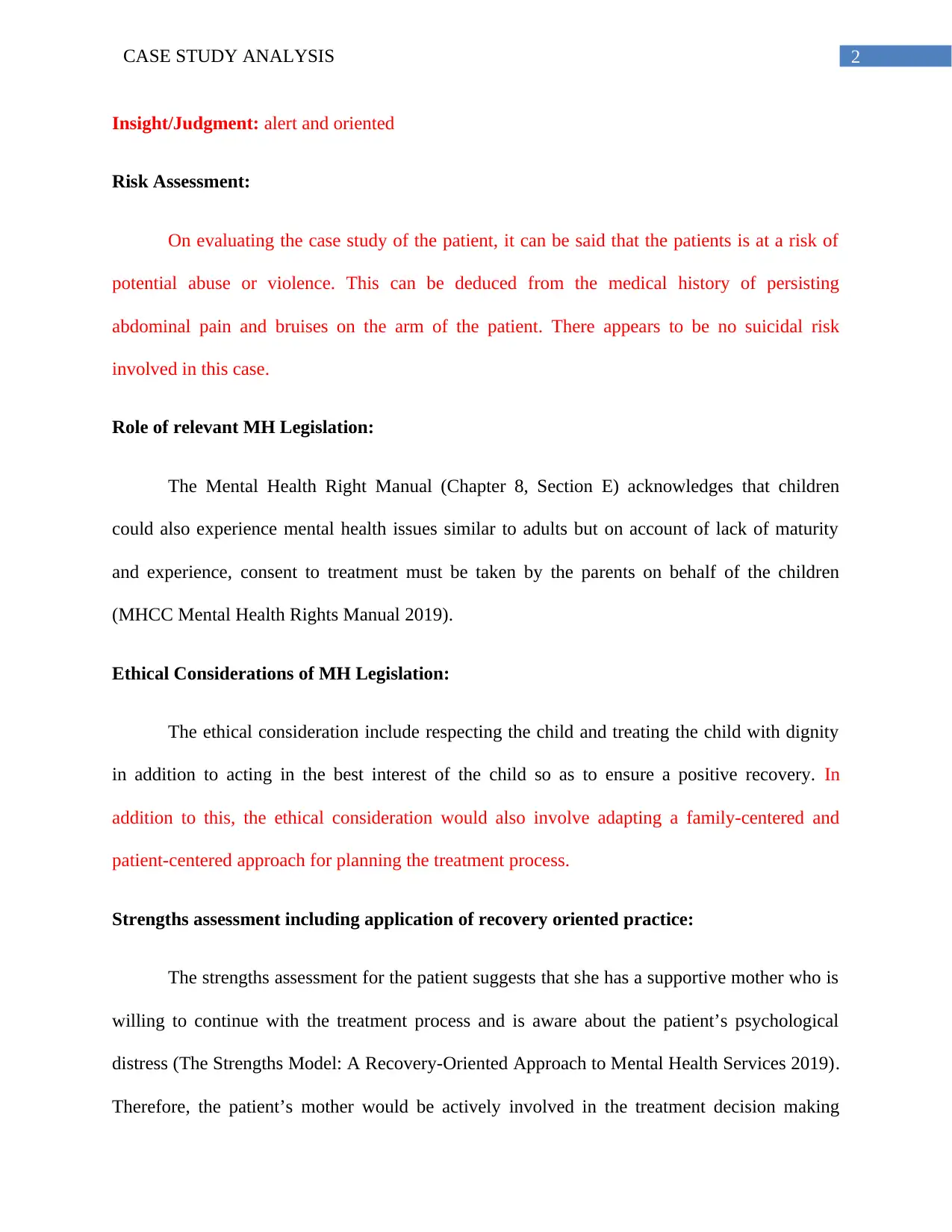
2CASE STUDY ANALYSIS
Insight/Judgment: alert and oriented
Risk Assessment:
On evaluating the case study of the patient, it can be said that the patients is at a risk of
potential abuse or violence. This can be deduced from the medical history of persisting
abdominal pain and bruises on the arm of the patient. There appears to be no suicidal risk
involved in this case.
Role of relevant MH Legislation:
The Mental Health Right Manual (Chapter 8, Section E) acknowledges that children
could also experience mental health issues similar to adults but on account of lack of maturity
and experience, consent to treatment must be taken by the parents on behalf of the children
(MHCC Mental Health Rights Manual 2019).
Ethical Considerations of MH Legislation:
The ethical consideration include respecting the child and treating the child with dignity
in addition to acting in the best interest of the child so as to ensure a positive recovery. In
addition to this, the ethical consideration would also involve adapting a family-centered and
patient-centered approach for planning the treatment process.
Strengths assessment including application of recovery oriented practice:
The strengths assessment for the patient suggests that she has a supportive mother who is
willing to continue with the treatment process and is aware about the patient’s psychological
distress (The Strengths Model: A Recovery-Oriented Approach to Mental Health Services 2019).
Therefore, the patient’s mother would be actively involved in the treatment decision making
Insight/Judgment: alert and oriented
Risk Assessment:
On evaluating the case study of the patient, it can be said that the patients is at a risk of
potential abuse or violence. This can be deduced from the medical history of persisting
abdominal pain and bruises on the arm of the patient. There appears to be no suicidal risk
involved in this case.
Role of relevant MH Legislation:
The Mental Health Right Manual (Chapter 8, Section E) acknowledges that children
could also experience mental health issues similar to adults but on account of lack of maturity
and experience, consent to treatment must be taken by the parents on behalf of the children
(MHCC Mental Health Rights Manual 2019).
Ethical Considerations of MH Legislation:
The ethical consideration include respecting the child and treating the child with dignity
in addition to acting in the best interest of the child so as to ensure a positive recovery. In
addition to this, the ethical consideration would also involve adapting a family-centered and
patient-centered approach for planning the treatment process.
Strengths assessment including application of recovery oriented practice:
The strengths assessment for the patient suggests that she has a supportive mother who is
willing to continue with the treatment process and is aware about the patient’s psychological
distress (The Strengths Model: A Recovery-Oriented Approach to Mental Health Services 2019).
Therefore, the patient’s mother would be actively involved in the treatment decision making
⊘ This is a preview!⊘
Do you want full access?
Subscribe today to unlock all pages.

Trusted by 1+ million students worldwide
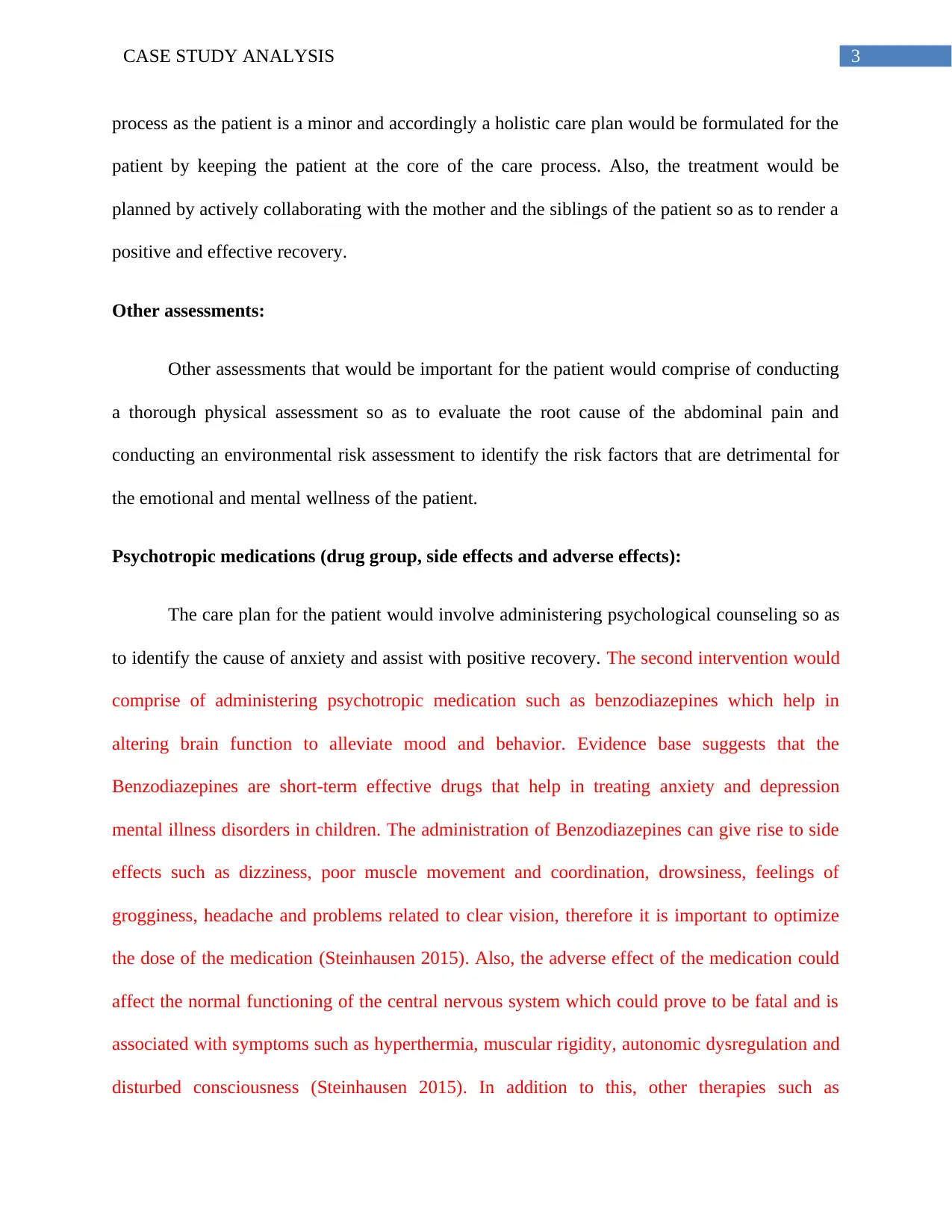
3CASE STUDY ANALYSIS
process as the patient is a minor and accordingly a holistic care plan would be formulated for the
patient by keeping the patient at the core of the care process. Also, the treatment would be
planned by actively collaborating with the mother and the siblings of the patient so as to render a
positive and effective recovery.
Other assessments:
Other assessments that would be important for the patient would comprise of conducting
a thorough physical assessment so as to evaluate the root cause of the abdominal pain and
conducting an environmental risk assessment to identify the risk factors that are detrimental for
the emotional and mental wellness of the patient.
Psychotropic medications (drug group, side effects and adverse effects):
The care plan for the patient would involve administering psychological counseling so as
to identify the cause of anxiety and assist with positive recovery. The second intervention would
comprise of administering psychotropic medication such as benzodiazepines which help in
altering brain function to alleviate mood and behavior. Evidence base suggests that the
Benzodiazepines are short-term effective drugs that help in treating anxiety and depression
mental illness disorders in children. The administration of Benzodiazepines can give rise to side
effects such as dizziness, poor muscle movement and coordination, drowsiness, feelings of
grogginess, headache and problems related to clear vision, therefore it is important to optimize
the dose of the medication (Steinhausen 2015). Also, the adverse effect of the medication could
affect the normal functioning of the central nervous system which could prove to be fatal and is
associated with symptoms such as hyperthermia, muscular rigidity, autonomic dysregulation and
disturbed consciousness (Steinhausen 2015). In addition to this, other therapies such as
process as the patient is a minor and accordingly a holistic care plan would be formulated for the
patient by keeping the patient at the core of the care process. Also, the treatment would be
planned by actively collaborating with the mother and the siblings of the patient so as to render a
positive and effective recovery.
Other assessments:
Other assessments that would be important for the patient would comprise of conducting
a thorough physical assessment so as to evaluate the root cause of the abdominal pain and
conducting an environmental risk assessment to identify the risk factors that are detrimental for
the emotional and mental wellness of the patient.
Psychotropic medications (drug group, side effects and adverse effects):
The care plan for the patient would involve administering psychological counseling so as
to identify the cause of anxiety and assist with positive recovery. The second intervention would
comprise of administering psychotropic medication such as benzodiazepines which help in
altering brain function to alleviate mood and behavior. Evidence base suggests that the
Benzodiazepines are short-term effective drugs that help in treating anxiety and depression
mental illness disorders in children. The administration of Benzodiazepines can give rise to side
effects such as dizziness, poor muscle movement and coordination, drowsiness, feelings of
grogginess, headache and problems related to clear vision, therefore it is important to optimize
the dose of the medication (Steinhausen 2015). Also, the adverse effect of the medication could
affect the normal functioning of the central nervous system which could prove to be fatal and is
associated with symptoms such as hyperthermia, muscular rigidity, autonomic dysregulation and
disturbed consciousness (Steinhausen 2015). In addition to this, other therapies such as
Paraphrase This Document
Need a fresh take? Get an instant paraphrase of this document with our AI Paraphraser

4CASE STUDY ANALYSIS
administration of cognitive behavioral therapy can also assist with the recovery process. Nursing
intervention would primarily involve minimizing risks and imparting psychological education to
Jodie’s mother and siblings so as to assist the patient with the recovery process.
administration of cognitive behavioral therapy can also assist with the recovery process. Nursing
intervention would primarily involve minimizing risks and imparting psychological education to
Jodie’s mother and siblings so as to assist the patient with the recovery process.
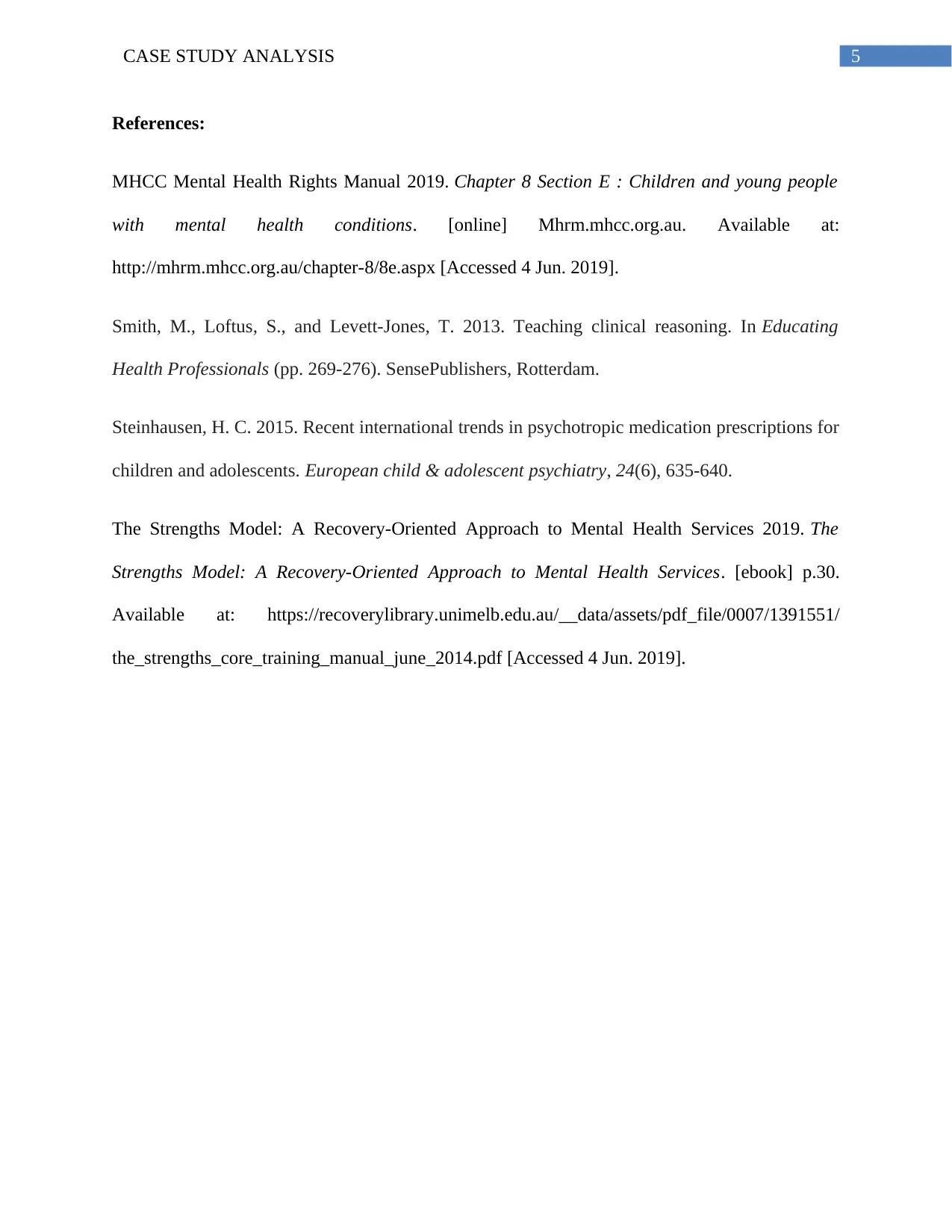
5CASE STUDY ANALYSIS
References:
MHCC Mental Health Rights Manual 2019. Chapter 8 Section E : Children and young people
with mental health conditions. [online] Mhrm.mhcc.org.au. Available at:
http://mhrm.mhcc.org.au/chapter-8/8e.aspx [Accessed 4 Jun. 2019].
Smith, M., Loftus, S., and Levett-Jones, T. 2013. Teaching clinical reasoning. In Educating
Health Professionals (pp. 269-276). SensePublishers, Rotterdam.
Steinhausen, H. C. 2015. Recent international trends in psychotropic medication prescriptions for
children and adolescents. European child & adolescent psychiatry, 24(6), 635-640.
The Strengths Model: A Recovery-Oriented Approach to Mental Health Services 2019. The
Strengths Model: A Recovery-Oriented Approach to Mental Health Services. [ebook] p.30.
Available at: https://recoverylibrary.unimelb.edu.au/__data/assets/pdf_file/0007/1391551/
the_strengths_core_training_manual_june_2014.pdf [Accessed 4 Jun. 2019].
References:
MHCC Mental Health Rights Manual 2019. Chapter 8 Section E : Children and young people
with mental health conditions. [online] Mhrm.mhcc.org.au. Available at:
http://mhrm.mhcc.org.au/chapter-8/8e.aspx [Accessed 4 Jun. 2019].
Smith, M., Loftus, S., and Levett-Jones, T. 2013. Teaching clinical reasoning. In Educating
Health Professionals (pp. 269-276). SensePublishers, Rotterdam.
Steinhausen, H. C. 2015. Recent international trends in psychotropic medication prescriptions for
children and adolescents. European child & adolescent psychiatry, 24(6), 635-640.
The Strengths Model: A Recovery-Oriented Approach to Mental Health Services 2019. The
Strengths Model: A Recovery-Oriented Approach to Mental Health Services. [ebook] p.30.
Available at: https://recoverylibrary.unimelb.edu.au/__data/assets/pdf_file/0007/1391551/
the_strengths_core_training_manual_june_2014.pdf [Accessed 4 Jun. 2019].
⊘ This is a preview!⊘
Do you want full access?
Subscribe today to unlock all pages.

Trusted by 1+ million students worldwide
1 out of 6
Related Documents
Your All-in-One AI-Powered Toolkit for Academic Success.
+13062052269
info@desklib.com
Available 24*7 on WhatsApp / Email
![[object Object]](/_next/static/media/star-bottom.7253800d.svg)
Unlock your academic potential
Copyright © 2020–2025 A2Z Services. All Rights Reserved. Developed and managed by ZUCOL.





